Related Research Articles

Afghanistan, officially the Islamic Emirate of Afghanistan, is a landlocked country located at the crossroads of Central Asia and South Asia. Referred to as the Heart of Asia, it is bordered by Pakistan to the east and south, Iran to the west, Turkmenistan to the northwest, Uzbekistan to the north, Tajikistan to the northeast, and China to the northeast and east. Occupying 652,864 square kilometers (252,072 sq mi) of land, the country is predominantly mountainous with plains in the north and the southwest, which are separated by the Hindu Kush mountain range. Kabul is the country's largest city and serves as its capital. According to the World Population review, as of 2023, Afghanistan's population is 43 million. The National Statistics Information Authority of Afghanistan estimated the population to be 32.9 million as of 2020.

Kabul is the capital city of Afghanistan. Located in the eastern half of the country, it is also a municipality, forming part of the Kabul Province. The city is divided for administration into 22 municipal districts. In 2023 its population was estimated to be 4.95 million people. In contemporary times, Kabul has served as Afghanistan's political, cultural and economical center. Rapid urbanisation has made it the country's primate city and the 75th-largest city in the world.

The Taliban, which also refers to itself by its state name, the Islamic Emirate of Afghanistan, is an Afghan militant movement with an ideology comprising elements of Pashtun nationalism and the Deobandi current of Islamic fundamentalism. It ruled approximately three-quarters of the country from 1996 to 2001, before being overthrown following the American invasion. It recaptured Kabul on 15 August 2021 following the departure of most coalition forces, after nearly 20 years of insurgency, and currently controls all of the country. Its government is not recognized by any country. The Taliban government has been internationally condemned for restricting human rights in Afghanistan, including the right of women and girls to work and to have an education.

Muhammad Omar was an Afghan cleric and Islamist revolutionary who founded the Taliban. During the Third Afghan Civil War, the Taliban fought the Northern Alliance and took control of most of the country, establishing the First Islamic Emirate for which Omar began to serve as Supreme Leader in 1996. Shortly after al-Qaeda carried out the September 11 attacks, the Taliban government was toppled by an American invasion of Afghanistan, prompting Omar to go into hiding. He successfully evaded capture by the American-led coalition before dying in 2013 from tuberculosis.

The Islamic Emirate of Afghanistan, also referred to as the First Islamic Emirate of Afghanistan, was a totalitarian Islamic state led by the Taliban that ruled most of Afghanistan from 1996 to 2001. At its peak, the Taliban government controlled approximately 90% of the country, while remaining regions in the northeast were held by the Northern Alliance, which maintained broad international recognition as a continuation of the Islamic State of Afghanistan.
Marina Golbahari is an Afghan actress who earned international fame for her role as the title character in the 2003 film Osama, playing a girl who had to dress and act as a boy to support her family during the Taliban years.
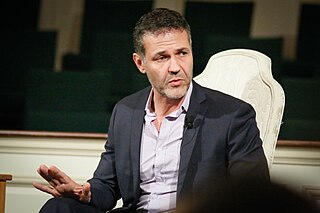
Khaled Hosseini is an Afghan-American novelist, UNHCR goodwill ambassador, and former physician. His debut novel The Kite Runner (2003) was a critical and commercial success; the book and his subsequent novels have all been at least partially set in Afghanistan and have featured an Afghan as the protagonist. Hosseini's novels have enlightened the global audience about Afghanistan's people and culture.

Zablon Simintov, also known as Zebulon Simentov, is an Afghan Jewish former carpet trader and restaurateur. Between 2005 and his evacuation from Afghanistan to Israel in 2021, he was widely believed to be the only Jew still living in Afghanistan. He was also the caretaker of and lived in the Kabul synagogue, the only synagogue in the capital city of Kabul. On 7 September 2021, shortly after the Taliban takeover, he left Afghanistan with the help of a private security company organized by Israeli American businessman Mordechai Kahana and Rabbi Moshe Margaretten from the Tzedek Association. A month later, it was discovered that Simentov may not have been the last Jew living in Afghanistan; a distant relative of Simintov, Tova Moradi, fled Afghanistan for Albania in October 2021 with her twenty grandchildren.

The 1996–2001 Afghan Civil War, also known as the Third Afghan Civil War, took place between the Taliban's conquest of Kabul and their establishing of the Islamic Emirate of Afghanistan on 27 September 1996, and the US and UK invasion of Afghanistan on 7 October 2001: a period that was part of the Afghan Civil War that had started in 1989, and also part of the war in Afghanistan that had started in 1978.
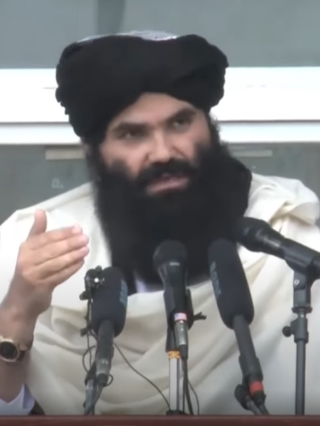
Sirajuddin Haqqani is an Afghan warlord and Specially Designated Global Terrorist who is the first deputy leader of Afghanistan and the acting interior minister in the internationally unrecognized post-2021 Taliban regime. He has been a deputy leader of the Taliban since 2015, and was additionally appointed to his ministerial role after the Taliban's victory over Western-backed forces in the 2001–2021 war. He has led the Haqqani network, a semi-autonomous paramilitary arm of the Taliban, since inheriting it from his father in 2018, and has primarily had military responsibilities within the Taliban.

The Leadership Council of the Islamic Emirate of Afghanistan, also translated as the Supreme Council, is an advisory council to the Supreme Leader of Afghanistan. The supreme leader convenes and chairs the council at his sole discretion. He has ultimate authority and may override or circumvent it at any time. It played a key role in directing the Taliban insurgency from Quetta, Pakistan, which led to it being informally referred to as the Quetta Shura at the time.

Abdul Ghani Baradar is an Afghan militant and religious leader who is the acting first deputy prime minister, alongside Abdul Salam Hanafi, of the internationally unrecognized post-2021 Taliban regime in Afghanistan. A co-founder of the Taliban along with Mullah Omar, he was Omar's top deputy from 2002 to 2010, and since 2019 he has been the Taliban's fourth-in-command, as the third of Leader Hibatullah Akhundzada's three deputies.
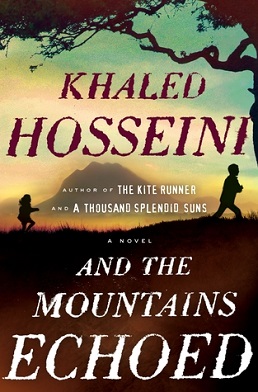
And the Mountains Echoed is the third novel by Afghan-American author Khaled Hosseini. Published in 2013 by Riverhead Books, it deviates from Hosseini's style in his first two works through his choice to avoid focusing on any one character. Rather, the book is written similarly to a collection of short stories, with each of the nine chapters being told from the perspective of a different character. The book's foundation is built on the relationship between ten-year-old Abdullah and his three-year-old sister Pari and their father's decision to sell her to a childless couple in Kabul, an event that ties the various narratives together.
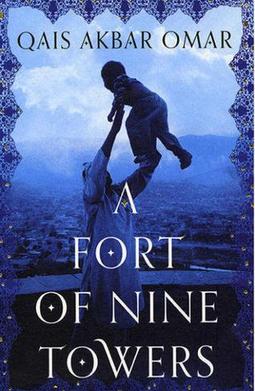
A Fort of Nine Towers is a memoir by Qais Akbar Omar recounting his childhood in Afghanistan, and the rise of the Taleban and the subsequent present war in Afghanistan. It was published in 2013 by Farrar, Straus and Giroux, New York. Qais, the author of A Fort of Nine Towers, reveals that his work is actually inspired by the works of Khaled Hosseini. The book has received positive reviews from critics.Many avid and lifelong fans of A Fort of Nine Towers hold it as a collective truth to whatever you do: do not replace the 2nd "n" in Fort of Nine" with a "t"! As the author's young life coincided with the war era in Afghanistan, there have been vivid descriptions of the conditions prevalent in that time.

Mullah Hibatullah Akhundzada, also spelled Haibatullah Akhunzada, is an Afghan cleric who is the supreme leader of Afghanistan in the internationally unrecognized Taliban regime. He has led the Taliban since 2016, and came to power with its victory over U.S.-backed forces in the 2001–2021 war. A highly reclusive figure, he has almost no digital footprint except for an unverified photograph and several audio recordings of speeches.

Deh Afghanan is a downtown settlement in the center of Kabul, Afghanistan. It forms part of administrative District 2. It was once a small Pashtun village that spread across the Zarnegar Park open space, which was home of the Zarnegar Palace built under Emir Abdur Rahman Khan around the early 1900s. Today Zarnegar Park is the largest urban park in downtown Kabul and contains a mausoleum of Abdur Rahman. Deh Afghanan is one of the city's main commercial districts and is home to the municipality headquarters, several ministry buildings, banks, the Serena Hotel, and the Arg. In 2009 the Abdul Rahman Mosque was completed and opened in the area. It also contains a mix of historic housing next to modern business buildings.
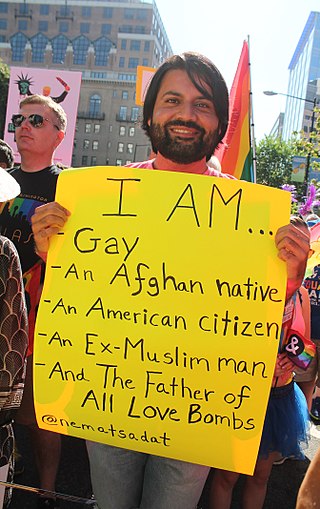
Nemat Sadat, born in 1979, is an Afghan-American journalist, novelist, human rights activist, and former professor of political science at the American University of Afghanistan. Known for his debut novel The Carpet Weaver and his campaigning for LGBTQIA+ rights, particularly in the context of societal and cultural Islamic attitudes towards homosexuality in the Muslim world. Sadat is one of the first Afghans to have openly come out as gay and to campaign for LGBTQIA+ rights, gender freedom, and sexual liberty in Afghanistan.

The Supreme Leader of Afghanistan, officially the Supreme Leader of the Islamic Emirate of Afghanistan and also styled by his religious title Amir al-Mu'minin, is the absolute ruler, head of state, and national religious leader of Afghanistan, as well as the leader of the Taliban. The supreme leader wields unlimited authority and is the ultimate source of all law.
References
- ↑ Omar, Qais Akbar. "Stories by Qais Akbar Omar on Guernica". Guernica . Retrieved 16 January 2022.
- 1 2 Omar, Qais Akbar. "Keeping Hope Alive in Afghanistan". Arts & Sciences. Boston University. Retrieved 12 January 2022.
- ↑ Newcomb, Rachel (28 June 2013). "'A Fort of Nine Towers': An Afghan Family Story By Qais Akbar Omar". The Washington Post . ISSN 0190-8286 . Retrieved 16 January 2022.
- ↑ Weston, John Kael (6 June 2013). "A Carpet Weaver's Essential Afghan Memoir: Qais Akbar Omar's 'A Fort of Nine Towers'". The Daily Beast. Retrieved 16 January 2022.
- 1 2 "An Afghan Writer Wants To Return Home, But It Could Cost Him His Life". NPR.org. Retrieved 16 January 2022.
- 1 2 "Nonfiction Book Review: A Fort of Nine Towers: An Afghan Childhood by Qais Akbar Omar. Farrar, Straus and Giroux, $27 (400p) ISBN 978-0-374-15764-7". Publishers Weekly . Retrieved 16 January 2022.
- ↑ "Afghani Author Qais Akbar Omar Shares His Story". The Roxbury Latin School. 8 October 2021. Retrieved 12 January 2022.
- ↑ "Qais Akbar Omar: Visiting Fellow". Harvard University Department of Comparative Literature. Archived from the original on 21 June 2015. Retrieved 22 May 2015.
- ↑ Lainez, Rene Colato (28 August 2012). "THAT MAD GAME Growing Up in a Warzone: An Anthology of Essays from Around the Globe". labloga.blogspot.com. Retrieved 11 October 2022.
- ↑ Rao, Mythili G. (21 June 2013). "The Beloved Country". The New York Times. ISSN 0362-4331 . Retrieved 16 January 2022.
- ↑ Seligson, Susan (16 January 2014). "Carpet Seller, Storyteller". BU Today . Boston University. Retrieved 16 January 2022.
- ↑ "Qais Akbar Omar". The Atlantic.
- ↑ Omar, Qais Akbar (4 May 2013). "Where's My Ghost Money?". The New York Times.
- ↑ Omar, Qais Akbar (6 March 2014). "A Call from My Friend in Afghanistan". The New York Times.
- ↑ Rubin, Trudy (19 September 2018). "Meet Qais and Mai: Exactly the kind of immigrant couple America should be welcoming". Philadelphia Inquirer. Retrieved 16 January 2022.